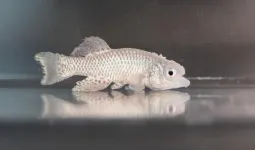(Press-News.org) Fasting interventions, which involve alternating periods of fasting and refeeding, are generally thought to improve health. But these interventions don’t work as well in old animals. The question is: Why? By studying the short-lived killifish, researchers at the Max Planck Institute for Biology of Ageing in Cologne have shown that older fish deviate from a youthful fasting and refeeding cycle, and instead enter a state of perpetual fasting, even when ingesting food. However, the benefits of refeeding after fasting in old killifish can be restored by genetically activating a specific subunit of AMP kinase, an important sensor of cellular energy. These mutant fish experienced improved health and longevity, indicating that both fasting and refeeding are needed to confer health benefits and act through AMP kinase to do so.
It has already been shown in many model organisms that a reduced diet, either through calorie restriction or periods of fasting, has a positive effect on health. However, it is difficult for humans to eat less throughout life. In order to find the most opportune timing to fasting, researchers introduced fasting interventions at different ages, finding that these interventions in older age do not yield the same benefits as they do in younger animals.
A team of researchers from Cologne, Germany, has now investigated the age-related fasting effects in killifish. Killifish are rapid-aging fish that go from young to old in just a few months. The researchers either fasted young and old fish for a few days or fed them twice a day. They found that the visceral adipose (fat) tissue of old fish became less responsive to feeding. "The adipose tissue is known to react most strongly to variations in food intake and has an important role in metabolism. That's why we looked at it more closely," explains Roberto Ripa, lead author of the study.
Alternation between fasting and eating is crucial
The researchers found that the inability to respond to the feeding phase set the fat tissue of old fish in a permanent state of fasting: energy metabolism is shut down, protein production is reduced, and tissue is not renewed. "We had assumed that old fish would not be able to switch to fasting after feeding. Surprisingly, the opposite was true, the old fish were in a permanent fasting state, even while eating food" says Adam Antebi, Director at the Max Planck Institute for Biology of Ageing and leader of the study.
Adipose tissue in a permanent fasting state
When the researchers looked more closely at how the fatty tissue of the old fish differed from that of the young, they came across a specific protein called AMP kinase. This kinase is a cellular energy sensor, and is made up of different subunits, of which the activity of the γ1 subunit decreases with age. When the scientists increased the activity of this subunit through genetic modification, the fasting-like state was counteracted and the old fish were healthier and even lived longer.
Human ageing
Interestingly, a link was also found between the γ1-subunit and human ageing. Significantly lower levels of the particular subunit were measured in samples from elderly patients. In addition, it was possible to show in the human samples: the less frail a person is in old age, the higher the level of the γ1-subunit.
"Of course, we don't yet know whether in humans the γ1-subunit is actually responsible for healthier ageing. In the next step, we will try to find molecules that activate precisely this subunit and investigate whether we can use them to positively influence ageing," explains Adam Antebi.
END
Cycle of fasting and feeding is crucial for healthy ageing
Genetic switch rescues ageing fish from continuous fasting trap
2023-11-13
ELSE PRESS RELEASES FROM THIS DATE:
How climate change could be affecting your brain
2023-11-13
A new element of the catastrophic impacts of climate change is emerging – how global warming is impacting the human brain.
In a paper published today in Nature Climate Change, an international team of academics explore the ways in which research has shown that a changing environment affects how our brains work, and how climate change could impact our brain function in the future. The paper is led by the University of Vienna with input from the universities of Geneva, New York, Chicago, Washington, Stanford, Exeter in the UK and the Max Plank Institute in Berlin. It also explores the role that neuroscientists can play in further understanding and addressing ...
Reducing systolic blood pressure to less than 120 mm Hg reduced cardiovascular event risk
2023-11-13
Research Highlights:
In a 3-year trial, intensive treatment with antihypertensive medication to reduce systolic blood pressure, the top number, to less than 120 mm Hg reduced cardiovascular disease events among people at high-risk for cardiovascular disease by 12% compared to standard treatment with a target of less than 140 mm Hg.
The effects were consistent regardless of participants’ diabetes status (Type 1, Type 2 or none) or history of stroke.
Embargoed until 8 a.m. ET, Monday, Nov. 13, 2023
PHILADELPHIA, ...
Ovarian cancer: Artificial intelligence predicts therapy responses
2023-11-13
A model based on artificial intelligence is able to predict the therapy outcome (measured by volumetric reduction of tumor lesions) in 80% of ovarian cancer patients. The AI-based model has an accuracy of 80%, significantly better than current clinical methods. The tool, named IRON (Integrated Radiogenomics for Ovarian Neoadjuvant therapy), analyzes various patient clinical features, from circulating tumor DNA in the blood (liquid biopsy) to general characteristics (age, health status, etc.), tumor markers, and disease images obtained through CT scans. ...
American Heart Association honors Gladstone President Deepak Srivastava with Distinguished Scientist Award
2023-11-13
Deepak Srivastava, MD, president of Gladstone Institutes and a renowned cardiovascular researcher, took the stage on Saturday in Philadelphia to receive the American Heart Association’s Distinguished Scientist award—joining a preeminent group of scientists and clinicians who’ve earned the association’s highest honor over the past decade.
The American Heart Association applauded Srivastava for his significant, original, and sustained scientific contributions that have advanced the association’s mission: “To be a relentless ...
Second-most distant galaxy discovered using James Webb Space Telescope
2023-11-13
The second- and fourth-most distant galaxies ever observed have been discovered in a region of space known as Pandora’s Cluster, or Abell 2744, using data from NASA’s James Webb Space Telescope (JWST). Following up on a deep field image of the area, an international team led by Penn State researchers confirmed the distance of these ancient galaxies and inferred their properties using new spectroscopic data — information about light emitted across the electromagnetic spectrum — from JWST. At nearly 33 billion light years away, these incredibly distant ...
Researchers explore origins of lupus, find reason for condition’s prevalence among women
2023-11-13
For years, researchers and clinicians have known that lupus, an autoimmune condition, occurs in women at a rate nine times higher than in men. Some of the factors that cause the disease’s high prevalence in women have eluded discovery, but in a new study investigating the immune system processes in lupus and the X chromosome, Johns Hopkins Medicine researchers have uncovered answers about the disease’s frequency in females.
A number of dysregulated genetic and biological pathways contribute to the development of lupus and its varied symptoms of muscle and joint pain, ...
Capture or reuse CO2 as a chemical source for the production of sustainable plastics
2023-11-13
A scientific team has developed a new polyurethane production technique using CO2 to create new types of easily recyclable plastics. The study, published in the Journal of the American Chemistry Society (J.A.C.S.), could provide a solution for the development of truly sustainable plastics.
Commodity plastics have transformed global industry. Whether in construction, clothing, vehicles or food packaging, these plastics are everywhere in our daily lives, so much so that their global use has been estimated at around 460 million tons in 2019. This number is staggering, but not surprising, because plastics, also known as synthetic polymers, have met a large ...
Self-deception may seed ‘hubris balancing,’ leading to Putin’s war against Ukraine
2023-11-13
Strategy underlies the affairs of national leaders, including how they view and interact with other states — but what if such strategy is borne of self-deception? That’s the thrust of a novel international relations theory that Ryuta Ito of Hiroshima University has now expanded upon, providing psychological rationalization to explain the irrational acts of national leaders at war.
Ito penned his reasoning on Sept. 5 in the journal International Affairs.
“Why did Vladimir Putin decide to invade Ukraine in 2022?” asked Ito, assistant professor in the Graduate School of Humanities and Social Sciences at Hiroshima University. ...
Appropriate statin prescriptions increase sixfold with automated referrals
2023-11-13
PHILADELPHIA— The odds of prescribing the appropriate dose of statins—a medicine used to lower “bad” cholesterol levels—increased sixfold when automated referrals were made to pharmacy services, instead of relying on traditional prescribing methods, according to researchers at the Perelman School of Medicine at the University of Pennsylvania. More than 90 million people in the U.S. use statins, making it one of the most prescribed medications in the county. Despite their effectiveness in lowering cholesterol levels and the risk of cardiovascular ...
When keeping secrets could brighten your day
2023-11-13
Though people often want to share good news as soon as they learn it, a study published by the American Psychological Association has found that keeping good news a secret before telling someone else could make people feel more energized and alive.
“Decades of research on secrecy suggest it is bad for our well-being, but this work has only examined keeping secrets that have negative implications for our lives. Is secrecy inherently bad for our well-being or do the negative effects of secrecy tend to stem from keeping negative secrets?” asked lead author Michael ...
LAST 30 PRESS RELEASES:
Sleep loss linked to higher atrial fibrillation risk in working-age adults
Visible light-driven deracemization of α-aryl ketones synergistically catalyzed by thiophenols and chiral phosphoric acid
Most AI bots lack basic safety disclosures, study finds
How competitive gaming on discord fosters social connections
CU Anschutz School of Medicine receives best ranking in NIH funding in 20 years
Mayo Clinic opens patient information office in Cayman Islands
Phonon lasers unlock ultrabroadband acoustic frequency combs
Babies with an increased likelihood of autism may struggle to settle into deep, restorative sleep, according to a new study from the University of East Anglia.
National Reactor Innovation Center opens Molten Salt Thermophysical Examination Capability at INL
International Progressive MS Alliance awards €6.9 million to three studies researching therapies to address common symptoms of progressive MS
Can your soil’s color predict its health?
Biochar nanomaterials could transform medicine, energy, and climate solutions
Turning waste into power: scientists convert discarded phone batteries and industrial lignin into high-performance sodium battery materials
PhD student maps mysterious upper atmosphere of Uranus for the first time
Idaho National Laboratory to accelerate nuclear energy deployment with NVIDIA AI through the Genesis Mission
Blood test could help guide treatment decisions in germ cell tumors
New ‘scimitar-crested’ Spinosaurus species discovered in the central Sahara
“Cyborg” pancreatic organoids can monitor the maturation of islet cells
Technique to extract concepts from AI models can help steer and monitor model outputs
Study clarifies the cancer genome in domestic cats
Crested Spinosaurus fossil was aquatic, but lived 1,000 kilometers from the Tethys Sea
MULTI-evolve: Rapid evolution of complex multi-mutant proteins
A new method to steer AI output uncovers vulnerabilities and potential improvements
Why some objects in space look like snowmen
Flickering glacial climate may have shaped early human evolution
First AHA/ACC acute pulmonary embolism guideline: prompt diagnosis and treatment are key
Could “cyborg” transplants replace pancreatic tissue damaged by diabetes?
Hearing a molecule’s solo performance
Justice after trauma? Race, red tape keep sexual assault victims from compensation
Columbia researchers awarded ARPA-H funding to speed diagnosis of lymphatic disorders
[Press-News.org] Cycle of fasting and feeding is crucial for healthy ageingGenetic switch rescues ageing fish from continuous fasting trap





